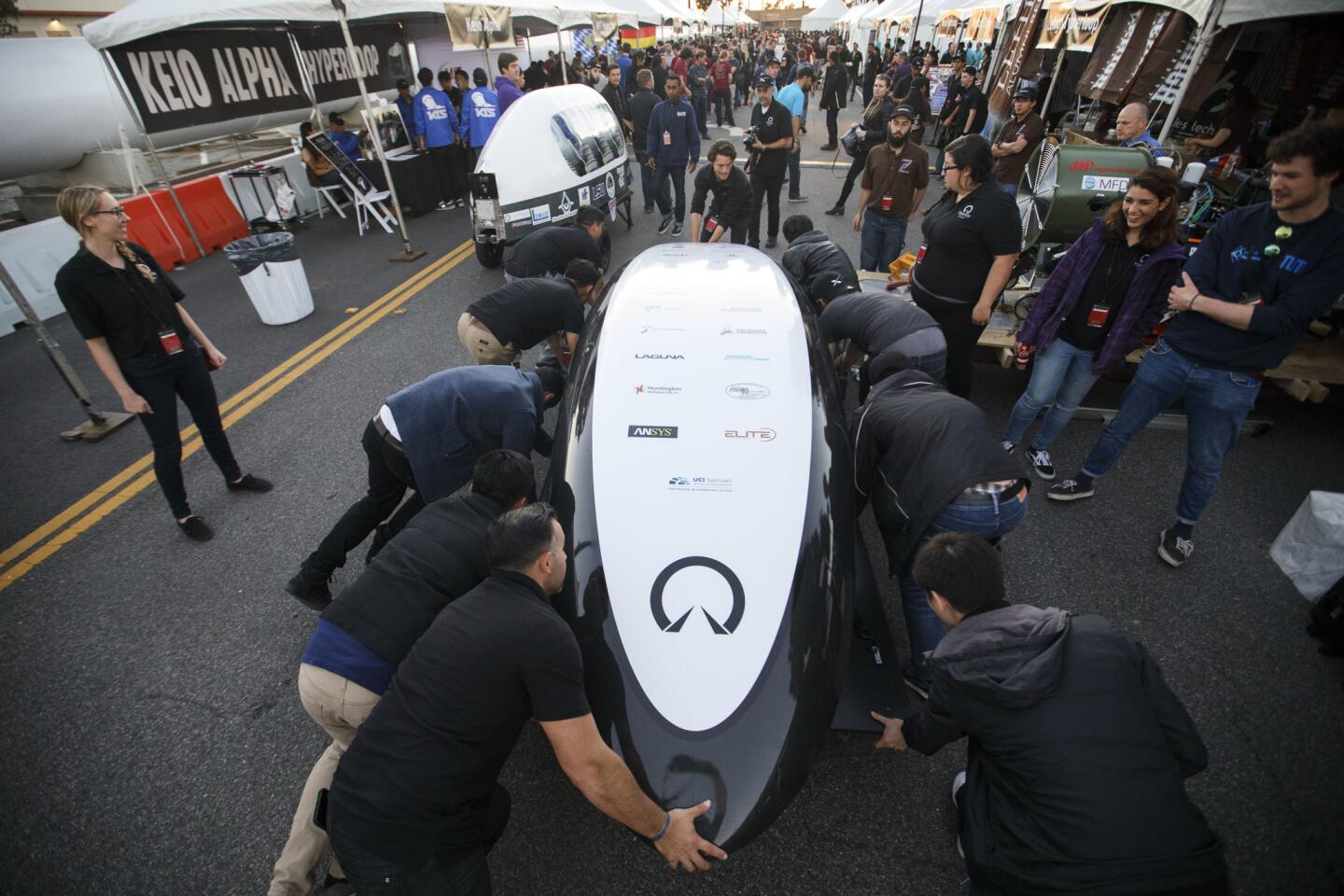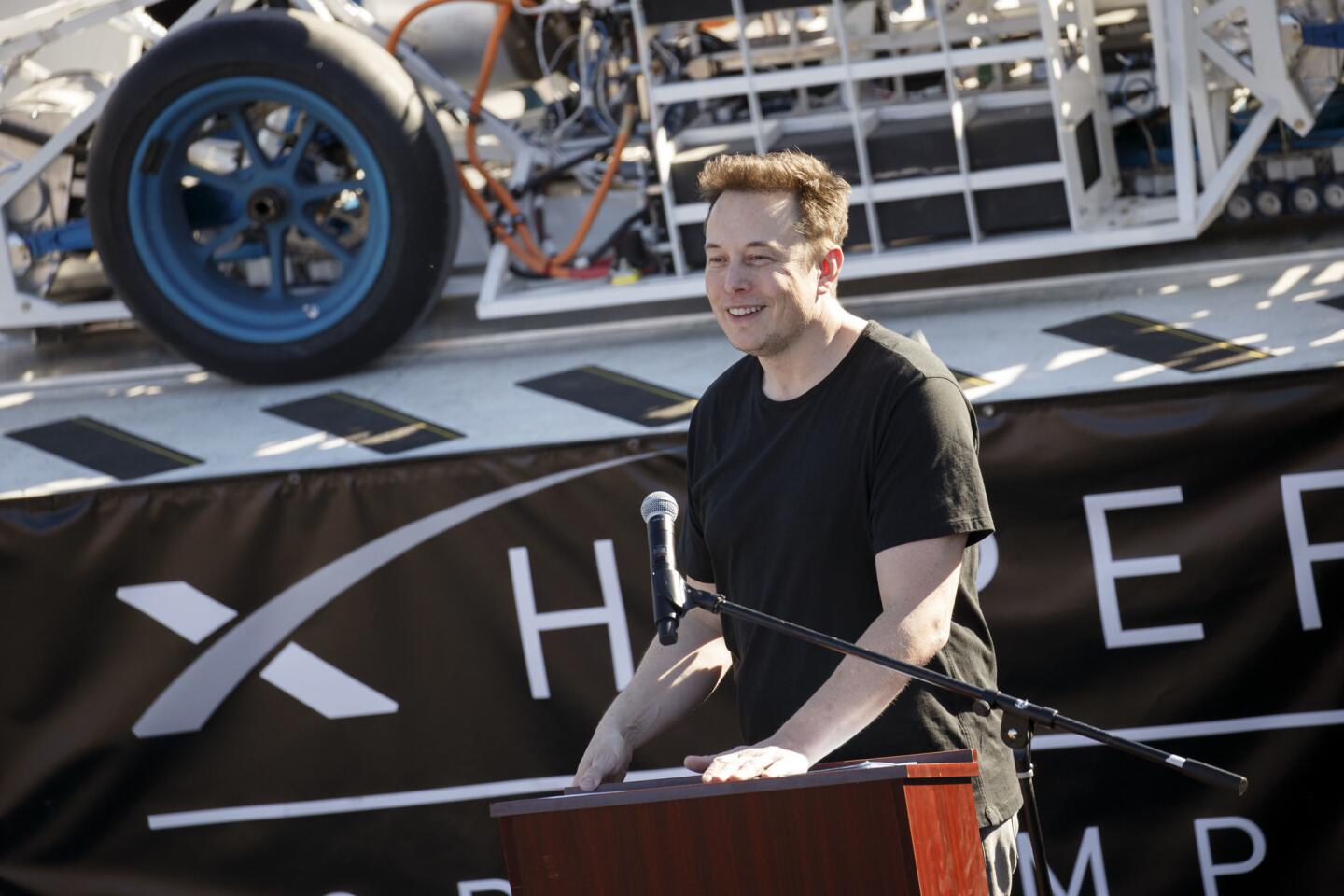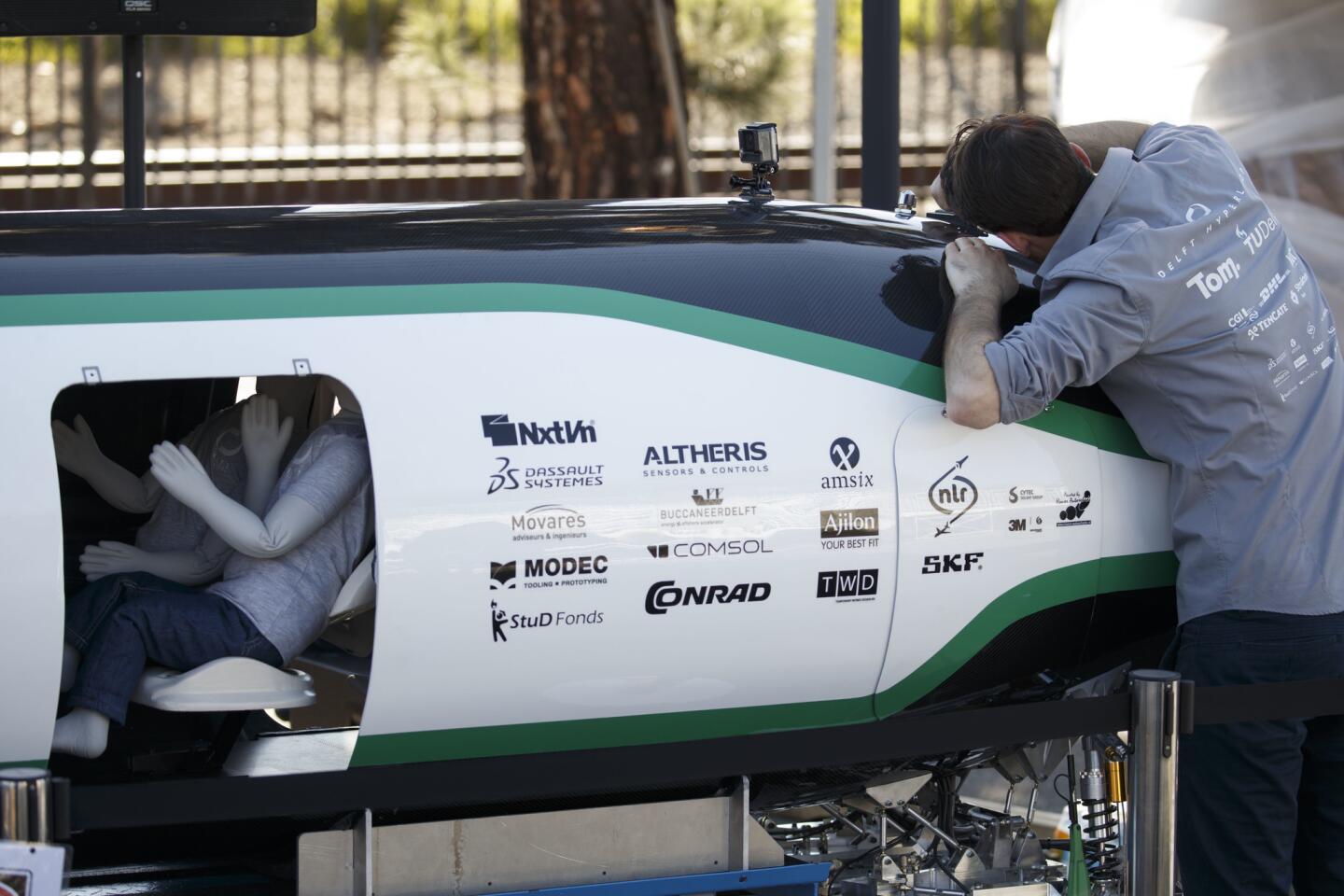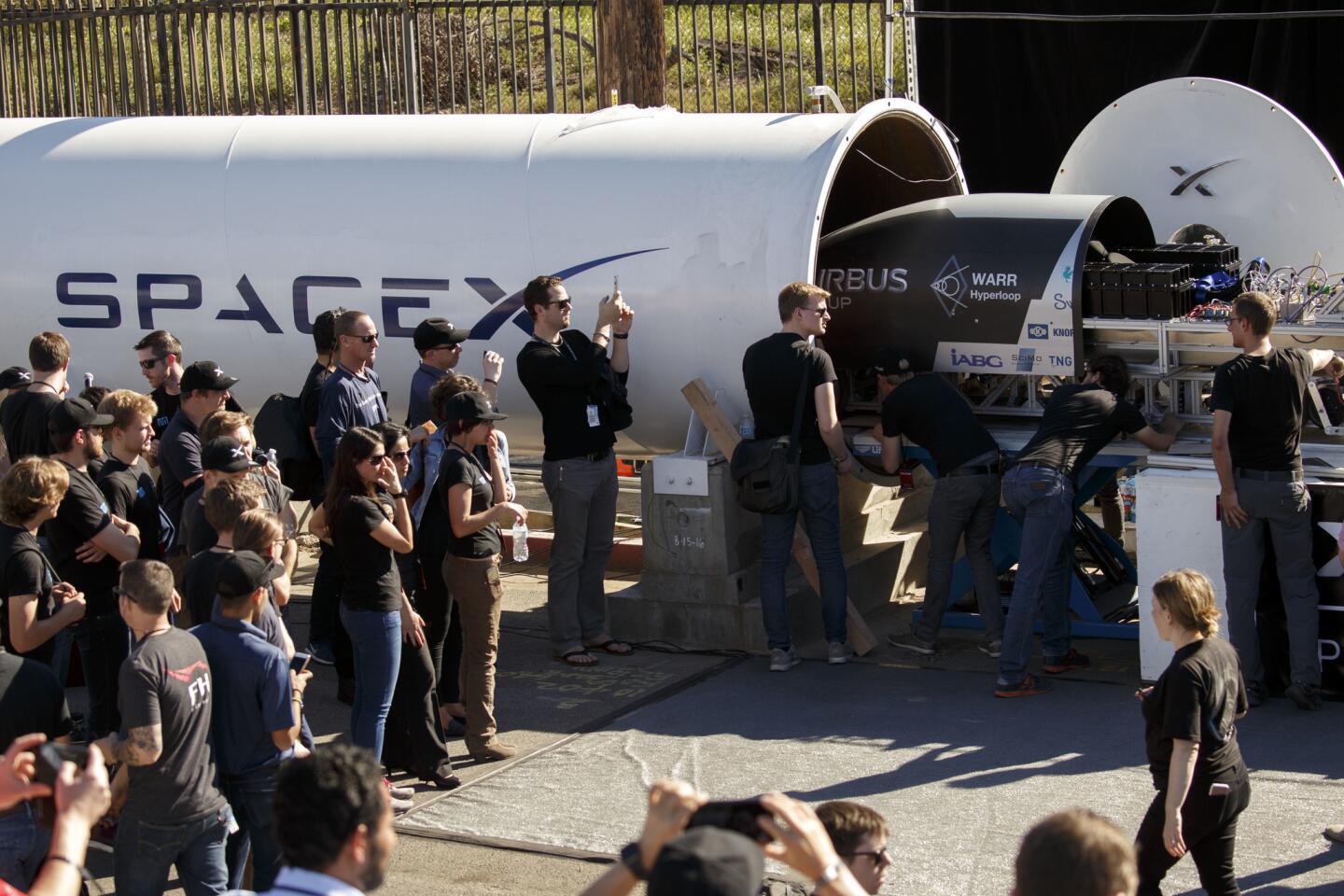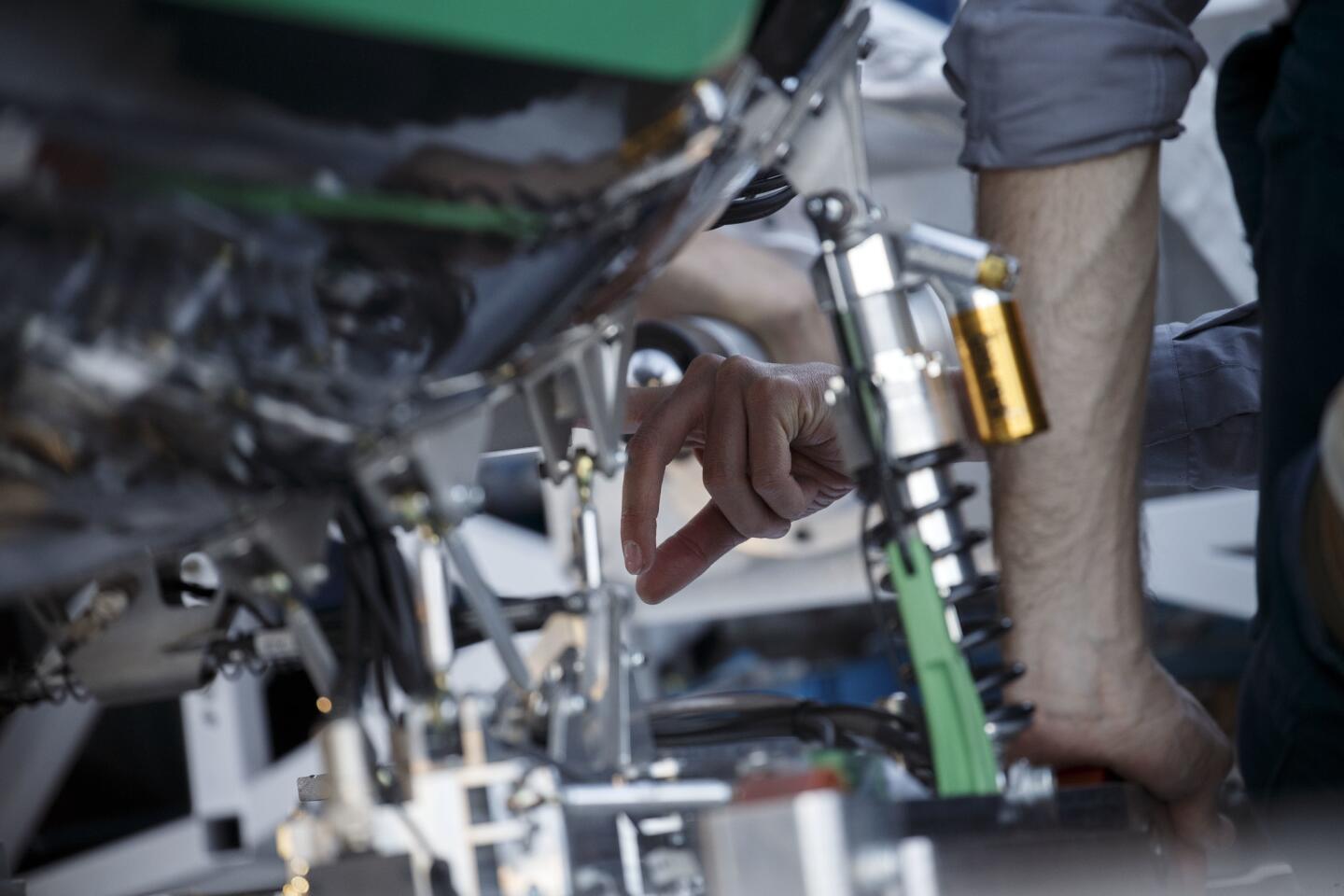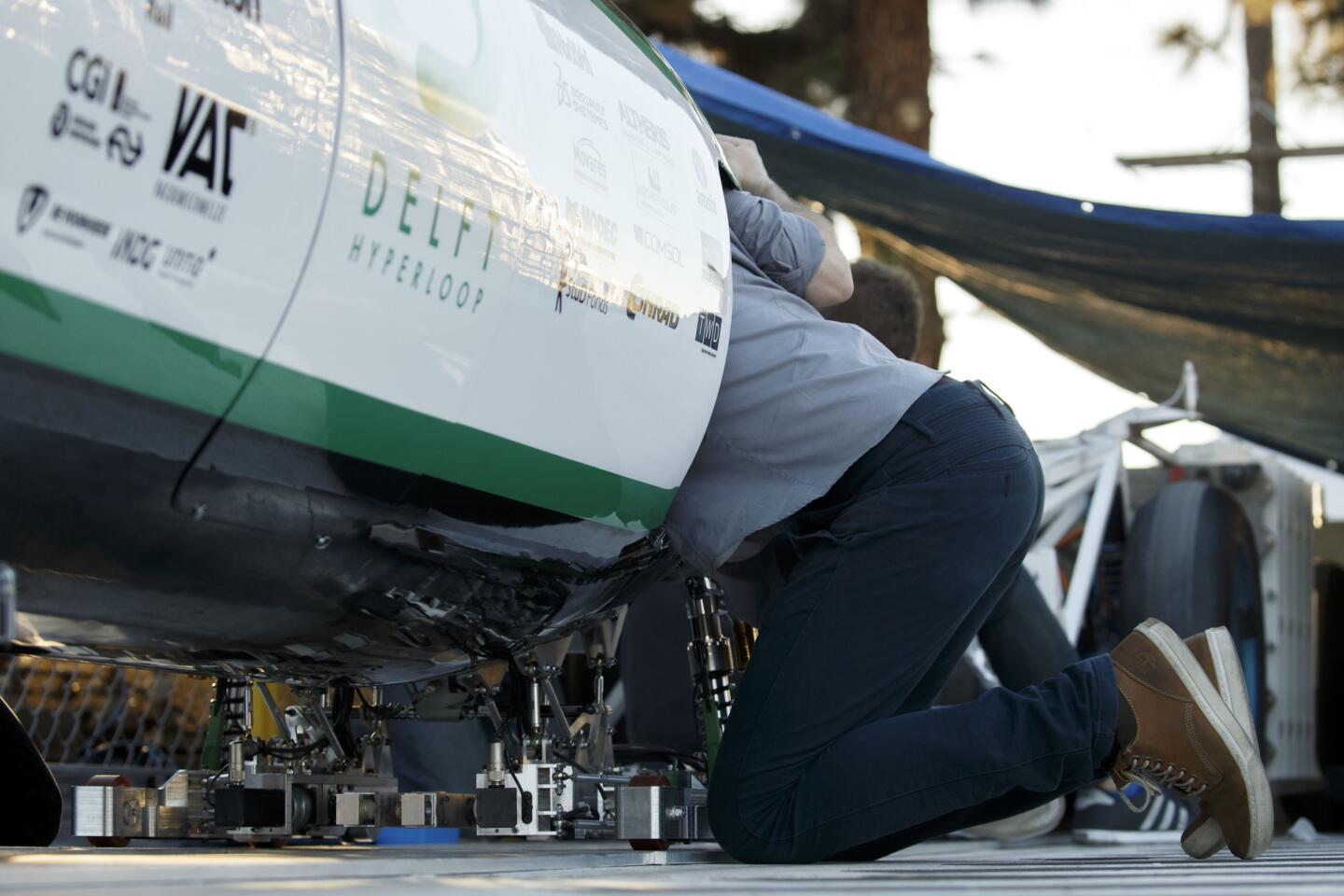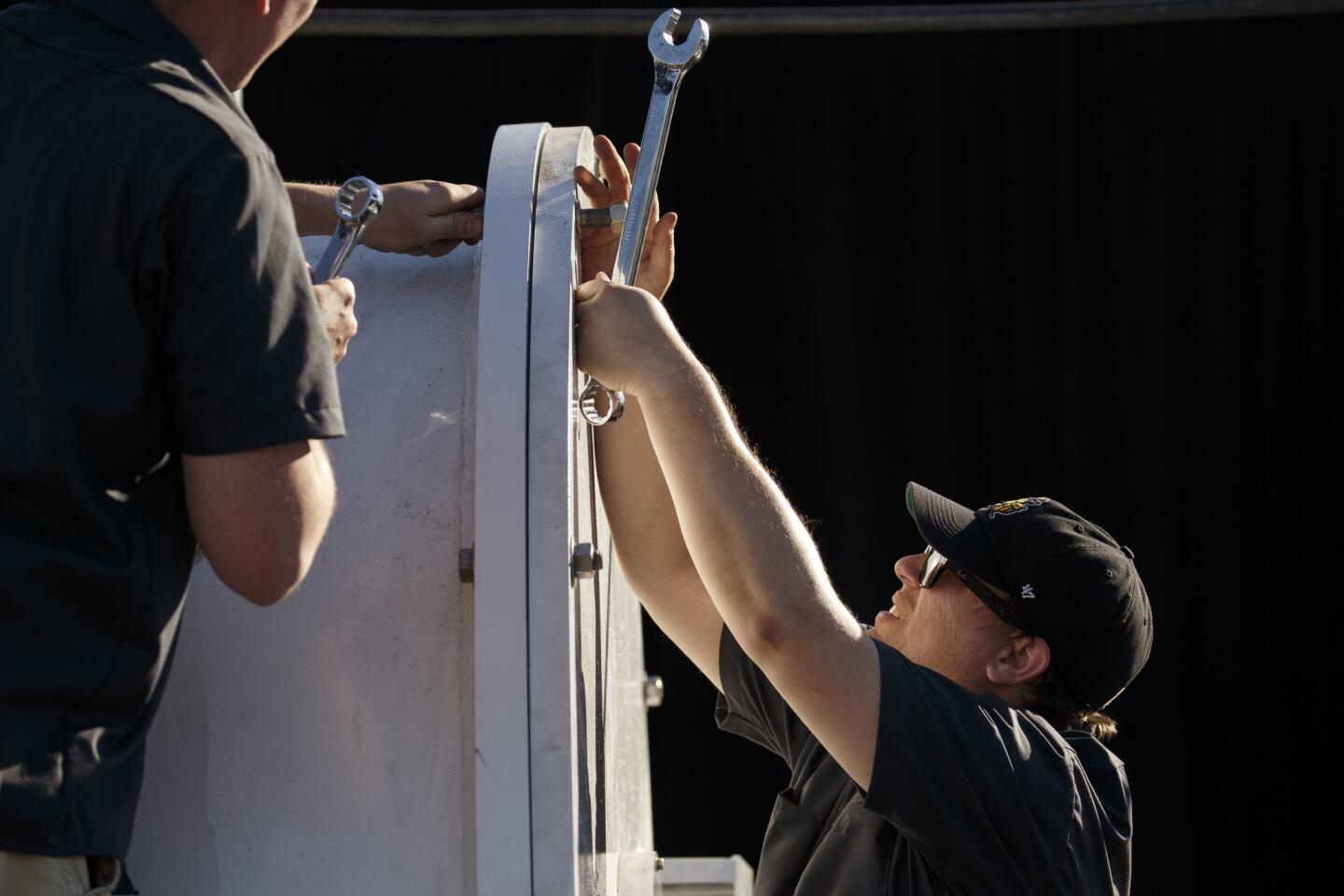Colleges take on the hyperloop with car batteries, magnets, carbon fiber and plenty of spirit
- Share via
UC Berkeley junior Ray Chen took a look around at dozens of other student projects. He scratched his head and let out a revelation of dejection.
“We seem to have underplayed a bit here,” Chen said.
UC Berkeley was among 30 universities and one high school that spent more than a year designing and developing railcars for a hyperloop — a high-tech transportation system popularized by billionaire entrepreneur Elon Musk. The idea is to transport people or goods at high speeds by shooting levitating pods through low-pressure tubes.
Over the weekend, students had their first chance to zip their creations through a nearly mile-long test tube Musk had erected on a closed traffic lane outside SpaceX headquarters in Hawthorne.
The UC Berkeley team’s creation didn’t rely on electronics as much as other schools. Its levitation system uses the natural opposition of two magnets rather than electrification to keep the pod suspended.
Teams of 15 to 45 members worked through winter break to put together their pods, many of which featured aluminum chassis, an array of batteries, electronics and motors and a carbon fiber shell. They arrived in Los Angeles early last week, working around the clock on the finishing touches. In a parking lot at SpaceX, they hurdled through what many called a daunting 101-item checklist. They also went through judging by SpaceX employees.
The competition is just one of a series of events expected as Musk seeks to support his idea. But neither he nor SpaceX has publicly backed the private companies trying to bring the hyperloop concept to life.

A team of students from TU Delft won the overall prize for best-designed Hyperloop capsule at a competition organized by Elon Musk’s SpaceX in Hawthorne.
SpaceX’s gigantic office complex offered a good backdrop for the hyperloop testing. Cars whirring by the test tube, helicopters and planes taking off from Hawthorne Airport and an old-school rail line beside the tube all marked the forms of transportation the hyperloop aims to best.
Some put hammers and chisels to work at the last moments; others turned to WD-40, power saws and computers.
Delft University of Technology from the Netherlands got its pod here by plane, but its self-made batteries weren’t allowed in air cargo, so the team went with a backup option — electrical bicycle batteries.
Northeastern University shipped its pod by truck. Its project received $150,000 in funding, and included free parts, said Ben Lippolis, a senior and the team’s business lead.
The University of Washington had one of the cheapest projects, coming in at $35,000, a student said. The team made many parts by hand, though it relied on batteries taken from a Honda Fit car.
Lehigh University had the biggest design, coming in at 3,300 pounds — an estimated three times more than anyone else’s, according to sophomore Emma Isaacs. The pod sported batteries from Tesla and other cars and an air compressor that allowed it to levitate for 45 minutes.
Isaacs described Lehigh’s as the closest of the entrants to a commercially viable design. Despite that, her team plans to take a new approach in the coming months. The hope is that it will get another crack at the SpaceX tube later this year and perform better.
SteelHouse looks to bounce back after lawsuit
Counterfeiting clicks. Defrauding customers. Deceiving rivals.
The accusations against Culver City start-up SteelHouse “were vicious,” said its founder and Chief Executive Mark Douglas.
But an investor in the online ad software company attempted to set Douglas straight about the allegations made by French rival Criteo in a lawsuit last summer.
“‘If we’re getting attacked, we must be doing something right,’” Douglas recalled the investor telling him. The way he saw it, Criteo had to have been scared about losing business to SteelHouse and wanted a way to slow it down.
Morale slumped at SteelHouse as the companies argued back and forth in court for several months. The allegations seemed to add further evidence to growing questions about the integrity of the online advertising ecosystem. An estimated billions of dollars are lost each year to ads that never end up in front of people’s eyes, and here again another company had been caught in numbers controversy.
SteelHouse’s software enables about 500 customers to analyze website visitors, decide what kinds of people to advertise to, design the ad and set pricing conditions and goals. SteelHouse handles the rest, including buying the ad. It charges a $1 fee for every 1,000 ads shown.
Many clients stopped working with SteelHouse, swinging the company to a slight loss last year. It declined to disclose other financial details.
“No customer wanted to be a part of this, and both companies lost some customers and that’s unfortunate,” Douglas said.
Criteo declined to comment.
The lawsuit came to a surprising conclusion in the fall, though. The two companies reached an undisclosed settlement, releasing a statement saying that the battle led to greater appreciation of each other’s businesses.
“I think I can say very emphatically, we were very pleased with the outcome,” said Peter Lee, an investor at SteelHouse shareholder Baroda Ventures. “How quickly it was resolved and that outcome given that they came after us, it was a thrill.”
Issues addressed in the lawsuit were ameliorated but SteelHouse didn’t overhaul its policies or procedures as a result, Douglas said.
“I don’t believe in swinging the pendulum out of fear,” he said.
Douglas also insists that the lawsuit had no effect on the results customers received.
Though some former customers mentioned in the lawsuit have continued to stay away, employees have largely stuck around. Some were able to cash out their shares last year. They also benefit from a three-day weekend once a month and a long list of perks, including a dog run and creekside view at one of the company’s two Culver City offices.
SteelHouse employs about 250 people, with plans to hire 100 this year.
The kind of online ads SteelHouse helps spread across the Web remain a target of criticism from consumers and privacy advocates. But Douglas says the world loves free content, giving him optimism that SteelHouse’s role won’t be diminished anytime soon. He says website owners just need to acknowledge some of the ads they display are counterproductive and sacrifice the short-term gains they bring.
Rubicon Project strategic alternatives assessment appears ongoing
Elsewhere in the Los Angeles advertising technology world, Rubicon Project is gauging its next steps as it struggles to keep pace with competitors.
The publicly traded Playa Vista firm must decide whether to use some of its $150 million in cash to develop the technology needed to catch up or sell the company. Private equity firms or companies growing their online ad businesses, such as Verizon, could be interested buyers.
Rubicon Project declined to comment.
In particular, Rubicon Project has struggled with the growing usage of smartphones because most of its advertising efforts had been focused on desktop Web browsers. The company’s software helps place banner and video ads across the Internet, but a number of factors are leading to lower fees.
Rubicon Project began reorganizing last year to slim parts of the business and invest in others. Whether it doubles down on that plan could become clear soon.
“They have plenty of cash to keep going but they have a responsibility to shareholders to explore the options,” said Jason Helfstein, a financial analyst at Oppenheimer & Co. who follows the company. “They can come back and say, ‘Look, we shopped the company. This is the demand for the company. But if we spend X over the next 18 months, we can get to Y.’”
Athletes and entertainers to get easier access to shares of hot start-ups shortly before IPOs
A Los Angeles financial adviser who says he works with sports stars, hip-hop artists and other celebrities has teamed with an investment firm to help clients get stakes in giant start-ups destined for blockbuster initial public offerings.
The celebs aren’t just in it for the money, though holding shares before an IPO often leads to greater ownership stakes and bigger returns on investment than becoming involved during the stock market debut.
Rashaun Williams, who’s worked at investment banks and a venture capital firm, said the stars want to be part of an exclusive club. Being able to name-drop that they’re an investor in widely recognized companies such as Uber, Airbnb or Snapchat maker Snap can lead to greater cachet than many already enjoy. Many of his clients also use, if not actively promote, the products and services they want to back — and they want to share in the financial gains along the way.
For the past few years, Williams has pooled together clients’ cash to buy up shares in about 100 start-ups, spanning just-launched ones to better-established firms. His client roster includes former NBA player Elton Brand, basketball agent David Falk and NFL player Derrick Morgan.
“When I meet them, their investments might be a Wingstop, a gas station and three start-ups, and I try to diversify them,” Williams said.
Now, he’s partnering with Manhattan Venture Partners, which typically purchases shares in privately held companies by paying off employees or venture capitalists to make diversifying an investment portfolio even easier. Manhattan Venture Partners plans to launch All-Star funds that each will hold stock in about a dozen companies expected to go public within a year or two.
The inaugural fund of hundreds of millions of dollars will have about 30 investors. When a company it holds goes public, the investors get a percentage of shares in proportion to their investment in the fund and can hold onto them indefinitely or sell them.
It’s a “one-stop shop for a basket” of multibillion-dollar companies, Williams said.
Flower delivery service receives $24 million, eyes Venice growth
Farm-to-doorstep flower delivery company Bouqs.com on Monday announced a $24-million investment that will be used to nearly double its workforce to up to 80 people in the coming months as its expands efforts in marketing and technology development.
The Venice company is looking for a new office in the beach neighborhood to accommodate the growth. Chief Executive John Tabis declined to discuss specific financial figures but said the company generated more cash than it spent during last year’s fourth quarter, suggesting it’s capable of turning a profit soon. But that might be more aberration than anything as Bouqs tries to increase spending to carve out a larger chunk of the online flower buying market. On a big day, the company produces about $1 million in sales.
“We’re not trying to being cash flow positive,” Tabis said. “We’re very much in growth mode.”
Founded in late 2012, Bouqs Co. spent the last year formalizing structures that had been hacked together in haste. It hired executives from other e-commerce companies such as Revolve and Fabletics. Tabis says he’s encouraged by data showing that nearly 60% of revenue is coming from repeat buyers.
Partech Ventures led the way in the investment, and its general partner Mark Menell joined Bouqs’ board of directors. Menell acknowledged online shopping companies have a reputation of petering out after they hit about $100 million in annual sales. But he’s optimistic that won’t be the case for Bouqs because it has no similar-size competitors and the big players in the space have gone years without an innovative feature.
Law firm expands business accelerator program
Stubbs Alderton & Markiles has formally mentored 22 start-ups in recent years, giving them working space, education and networking opportunities. Now, the Santa Monica law firm wants to step up its involvement. It has teamed with veteran digital media consultant Peter Csathy’s Creatv Media to help oversee the program and make investments in participants.
“By adding more companies, formalizing our class structure, expanding benefits and providing initial seed capital, we will give them a greater shot at success,” law firm managing partner Scott Alderton said in a statement.
Elsewhere on the Web
Snap plans to list its much-hyped initial public offering on the New York Stock Exchange, according to the Wall Street Journal.
Camera doorbell maker Ring raised $109 million from investors and wants to hold a small initial public offering this year, according to the Wall Street Journal.
Divergent 3D, which hopes to manufacture automobiles using 3-D-printing technology, received a $23-million investment, according to Fortune.
Rodin, which develops software for people creating projects to be viewed in virtual reality, is joining the Techstars accelerator, according to Socaltech.
Sidestep, an app for getting through lines at concerts, has received investment from several celebrities, according to Deal Street Asia.
In case you missed it
Tech workers aren’t known for political activism. But that may be changing.
Jeffrey Katzenberg, the founder and former chief executive of DreamWorks Animation, has raised $591 million for a new Beverly Hills investment firm, according to a regulatory filing.
Coming up
The Upfront Summit, a conference hosted by Santa Monica venture capital firm Upfront Ventures, takes place this week. Notable speakers include basketball team owner Mark Cuban, baseball star Alex Rodriguez and investor Vinod Khosla.
Twitter: @peard33
